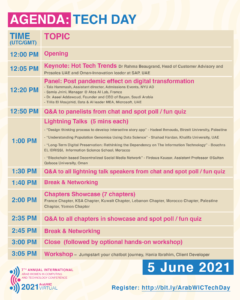Review of the 7th International Arab Women in Computing Conference
Background
ArabWIC is a non-profit organization that aims to support, inspire, retain, encourage collaboration, increase visibility and status of Arab women in computing, enabling them to achieve their career aspirations. Founded in 2012, it has built a community of more than 6000 Arab technical women from all over the world and has successfully created chapters in 19 countries.
June 5th, 2021 has marked the launch date of the 7th International Arab Women in Computing Conference (ArabWIC 2021). This year, given the global sanitary context, the conference took place online and was spread over several dates in June and August.
June 5th, 2021: Tech Day
The first day of the conference was dedicated to technical topics. It started with a keynote on Hot Tech Trends followed by a panel on the Post Pandemic effect on Digital Transformation.
There was then a series of lightning talks on Design Thinking process to develop interactive story apps, long-term digital preservation, understanding population genomics using data science and Blockchain based decentralized social media networks.
After a showcase from the France, Kuwait, Lebanon, Morocco, Palestine and Yemen ArabWIC chapters, we concluded Tech Day with a workshop on How to jumpstart your Chatbot journey.
 Focus: Panel: Post Pandemic effect on Digital Transformation
Focus: Panel: Post Pandemic effect on Digital Transformation
The pandemic caught companies off guard and challenged their digital readiness, businesses were impacted tremendously, new challenges rose and digital transformation is now fast forwarded.
The pandemic has reshaped many industries including healthcare, education, finance and e-commerce. The panel has hosted key speakers from industry and academia to tell us their side of the story: how the pandemic changed their industry, the key challenges they have faced and how they envision the post pandemic future.
We welcomed Tilila Moujahed, AI and Data Manager at Microsoft UAE, Samia Jnini, Head of AI Lab at Atos France and Tala Hammash, Assistant Director at NYUAD University. The diversity of the fields from which Tilila, Samia and Tala come has been very enriching and constructive, which has given us a clear vision on the effect of the pandemic during this year.
During the exchange, Samia and Tilila talked about the impact of the new ways of working, particularly in remote mode, and the challenges related to adapting to the new tools and modes of communication that have sometimes been imposed. They explained that these new ways of working, now well established, have proven their worth and are not about to disappear despite the inequalities and access difficulties that have been highlighted by the pandemic.
Regarding the opportunities that have arisen with the pandemic, Tala underlined the primordial role of women in the field of education and whose numbers are visibly growing compared to the last years.
However, several questions remain before we can affirm whether industry or other sectors have benefited from the pandemic. Has technology served us or not?
Of course, the automation of some services has made our lives easier in many ways, but the role of humans remains paramount, and the call for critical thinking is always welcome.

